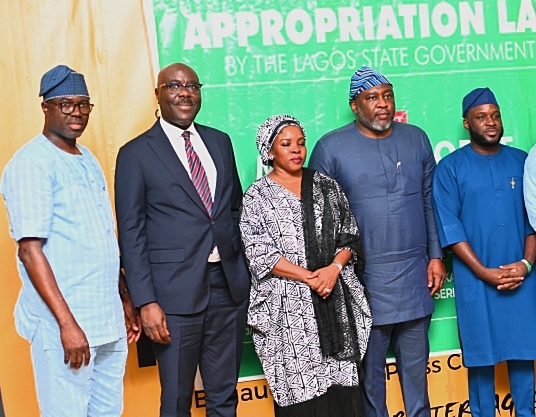The Lagos State government has announced its intention to allocate N550.689 billion towards the development and maintenance of infrastructure in 2024.
During the State 2024 Budget Analysis at the Bagauda Kaltho Press Centre in Alausa-Ikeja, Commissioner of Economic Planning and Budget, Ope George, revealed this information on Wednesday.
George explained that the allocated amount of N550.689 billion for infrastructure, which accounts for 24.28 percent of the total budget, is part of the ₦1.315 trillion capital budget for the year.
Among the infrastructure projects highlighted in the budget are the continuation of ongoing transportation projects, including the expansion of the rail network, road construction, and the completion of the Blue and Red Lines, as well as other metro projects within the State.
The Commissioner also mentioned that the budget will focus on the development of affordable housing schemes and urban renewal projects to address the housing deficit in the State. A total of N55.924 billion, representing 2.5 percent of the entire budget, will be allocated to this purpose. Some of the social housing projects include the completion of 444 units of building projects at Sangotedo Phase II, completion of 420 units of building projects at Ajara, Badagry, and the Phase Two construction of 136 units of building projects at Ibeshe II, among others.
He added that there would be focus on some “Special Projects: Continuous progress on major infrastructure projects like the Lekki-Epe International Airport, the Omu Creek, Blue and Red lines etc. It should be noted that most of these projects will be prioritized.”
In addition, the budget for this year, as outlined by the Commissioner, aims to finalize ongoing infrastructure projects and commence new ones. This includes completing front-loaded projects such as the new Massey Children’s Hospital, Omu Creek development, Opebi-Mende-Ojota Link Bridge, stadium renovations, rehabilitation of public schools, and upgrades to the Lekki-Epe and Lagos-Badagry Expressways. Notably, the budget also allocates funds to initiate the long-awaited Fourth Mainland Bridge project, which will connect Ikorodu to the Island.
George emphasized the State’s commitment to agriculture by increasing funding for agricultural projects and programs, implementing comprehensive training initiatives, and offering incentives tailored for farmers. Additionally, ongoing support for Micro, Small, and Medium Enterprises (MSMEs) remains a priority to stimulate economic growth and facilitate job creation.
“The State’s 5-year Agric roadmap stands as a testament to this commitment aiming to bolster support for farmers and enhance our overall food systems. This initiative prompted the State to allocate a total sum of N44.33 billion towards Central Food Security, fostering projects such as the Cattle Feedlot Project, Fish Processing Hub programs, and Wholesale Produce Hub & Market. These endeavors aim to elevate food quality, reduce prices, and optimize the Agricultural sector in the long run.”
To prioritize Human Capital Development through Education and Healthcare, which are crucial areas for the State, the administration believes that a healthy, skilled, and safe population can fully utilize the opportunities within the State to create value. As part of this commitment, the State has dedicated 13.35 percent of the total budget to personnel costs in 2024, marking a 33 percent increase compared to 2023. The allocation of N180.693 billion to the Education Sector will enable ongoing investment in educational infrastructure, digital skills initiatives, and vocational education, thereby improving learning opportunities for every child in the State.
George explained that the total budget size of ₦2.267 trillion will be funded from a total revenue estimate of ₦1.880 trillion. This revenue estimate comprises Internally Generated Revenue (IGR) of ₦1.189 trillion, Capital Receipts of ₦94.605 billion, and Federal Transfer of ₦596.629 billion. He added that the Lagos State Internal Revenue Service (LIRS) is expected to contribute 63% (N750 billion) of the projected IGR, while other government Ministries, Departments, and Agencies (MDAs) are expected to generate about 23% (N283.567 billion) of the revenue.
“We shall achieve this by deepening the revenue and increasing the tax net through the deployment of technology, economic intelligence, data gathering and analysis amongst other initiatives. There are huge revenue generating opportunities in the informal sector, including real estates, transportation, and trade, he said.”
He also noted, “The deficit of ₦387.125bn is projected to be funded by a combination of Internal, External Loans and Bond Issuance.”



